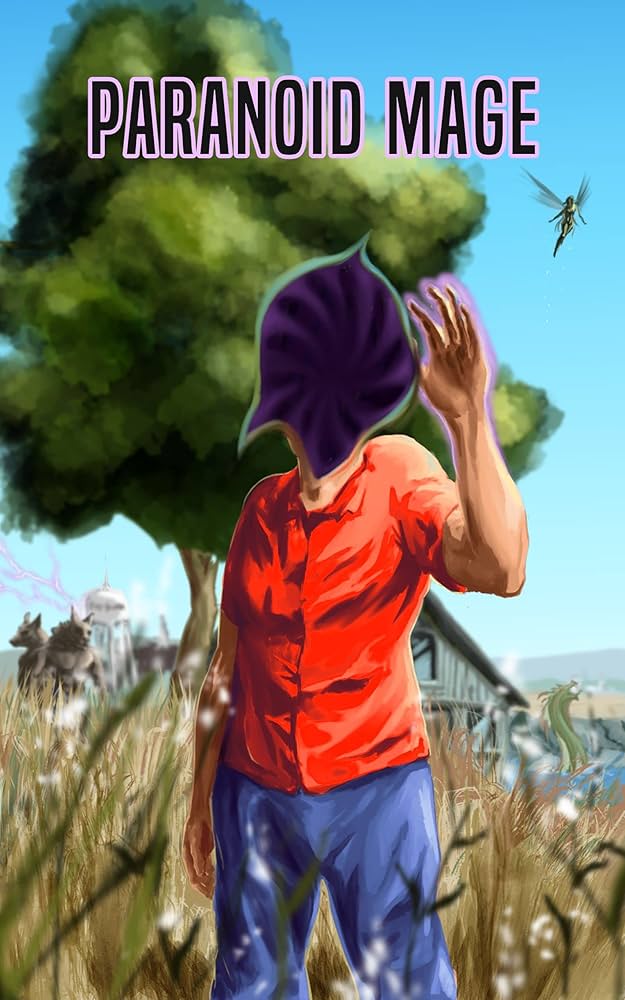Some thoughts on 'Paranoid Mage'
October 8, 2024 | 3,744 words | 18min read
This article contains heavy spoilers for the novel Paranoid Mage.
Introduction
I hadn’t read anything truly interesting in a long time, but recently I came across Paranoid Mage, a fantasy web-serial, which pleasantly surprised me after just a few chapters. This was especially so, because much of the content from the web novel community (including sites like NovelUpdates, Webnovel.com, ScribbleHub, and RoyalRoad) tends to be unoriginal, relying on the same overused tropes, with little character development and directionless stories.


However, when I started reading Paranoid Mage, it felt different, like a proper, well-structured story. That really excited me, but the more I read the worse it got, but I’m getting ahead of myself.
What is Paranoid Mage about?
Our protagonist, Callum, has spent his entire life seeing things that shouldn’t exist. Creatures like lizardmen, gnomes, and other magical phenomena. The first time he admitted to seeing these things, no one believed him. People thought he was crazy. So, Callum learned to keep quiet and ignore what he saw, not wanting others to think he was mad.
Everything changes when he gets caught up in a magical robbery, and the creatures realize he can see them. They bring him into the supernatural organization known as the Guild of Arcane Regulation (GAR), where he discovers he’s a mage. However, mages aren’t allowed to roam freely, they’re subject to strict regulations, education, and duties they must adhere to.
Deeply suspicious of the GAR, Callum chooses to run instead. A wild goose chase ensues.

Story Recap
The setting of Paranoid Mage is surprisingly refreshing, especially in a sea of isekai and LitRPG novels.
When I first read the synopsis and then the opening chapter, where Callum is captured by the GAR, I thought we were headed for a giant academy arc, where our protagonist would be enrolled in the GAR academy and the story would revolve around academy-related problems. This trope, in my opinion, is overused. For example, from NovelUpdates top 25 most popular novels this month, several feature an academy setting:
- Surviving as a Mage in a Magic Academy
- Mesugaki Tank Enters The Academy
- The Academy’s Weakest Became A Demon-Limited Hunter
- I Became A Flashing Genius At The Magic Academy
- Became a M*rderer in the Academy
Not that the academy trope is inherently bad, but it’s become so common that it’s harder to create a unique story around it.
Paranoid Mage, however, took a different route. Instead of following the academy narrative, our weak protagonist decides to run from the all-powerful GAR. This raises a lot of intriguing questions for the reader: How can Callum, who has just learned he’s a mage and has little power, escape an entire organization like the GAR? How can he learn to use magic when the GAR has a total monopoly on it? And many more.
Book One
The first book of Paranoid Mage executes the story very well. Callum settles in a small town, hoping to evade the GAR and train his magical abilities. The local vampires have been killing townsfolk for their blood, and after they kidnap a shifter (a monster species) with whom Callum had interacted, he decides to rescue her.
He accomplishes this by teleporting (as he’s a spatial mage) into the vampire nest while most of them are asleep, and he eradicates them using a shotgun.
The GAR takes notice and sends agents to investigate the vampire killings, forcing Callum to flee the town shortly after.
The boss of the freed shifter, impressed with Callum’s abilities, offers him a job: to wipe out four more vampire nests in exchange for magical knowledge. Callum agrees. While scouting vampire locations and planning the attacks, he also forms a study group with a young wizard he meets, where they teach each other.
Using a clever strategy, Callum successfully destroys the vampire nests. Before moving on, he returns one last time to bid farewell to the young mage in the study group, but the GAR is waiting for him. They trap and capture him.
Callum is transported to the GAR headquarters, where he is interrogated. Unable to teleport due to his powers being blocked, he uses a hidden teleportation device implanted in his body to escape. However, now that his identity has been revealed, the GAR knows who killed the vampires.
Book Two
Injured and teleported into the wilderness, Callum decides to hike to the nearest town. Along the way, he encounters wild fae hunting two humans and decides to help them by killing the fae. It turns out the fae were nobles, and the fae king becomes furious, chasing Callum. To escape, Callum flees to Europe and then travels through a portal to the dragon world, where the fae cannot follow.
Next, Callum decides to build another teleportation device, which requires rare materials from the vampire lands. As he attempts to mine these materials, he is discovered by GAR agents and chased across the globe. Eventually, Callum returns to America, where he learns that the couple he rescued earlier is being held by the GAR, with the help of another Fae King, Callum manages to rescue them. Exhausted, he goes to Mexico and builds an operating base using the money he earned from eliminating the vampires.
While there, he discovers that his partner, Lucy, who had been providing him with insider information about the GAR, has been captured. Callum decides to rescue her, but it turns out to be a trap with archmages lying in wait. Despite this, Callum manages to escape with Lucy.
Book Three
After witnessing how the GAR used Lucy to get to him and seeing what they had done to her, Callum decides that the GAR is corrupt and must be stopped. He sets his sights on Archmage Fane, planning an assassination during a meeting. His plan succeeds.
My Criticism
The story unfolds as an underdog tale, with our protagonist, isolated and friendless, taking on an entire supernatural organization—similar to Star Wars, where the rebels face off against the Empire.
This is where my first issue lies. The appeal of an underdog story comes from seeing someone weak triumph against overwhelming odds. In Star Wars, for instance, we have the full might of the Empire pitted against a small rebel group. The problem with Paranoid Mage is that while it presents itself in the same vein as an underdog story, the reality is far from it. In Star Wars, we had Darth Vader, a near-unassailable figure who served as a manifestation of the Empire’s will. More often than not, when Vader appeared, someone died (e.g., Raymus Antilles, who was strangled to death). And he didn’t just kill weak characters (e.g., Obi-Wan Kenobi).
When you compare this to the GAR and its leaders, the Archmages, in Paranoid Mage, what we see instead is incompetence, over and over. We are told by various characters how scary the GAR and Archmages are, but we never truly witness their power.
Here’s what we see instead:
- The first time we encounter an Archmage in action, Callum, a beginner mage, manages to rescue Lucy from a GAR prison, right under the noses of multiple Archmages, without them ever detecting him.
- The second time, Callum successfully assassinates an Archmage.
- Most of the other times we see the Archmages, they’re merely complaining about how the GAR can’t catch Callum.
- In the first book, the GAR still seems somewhat competent, as they are always on Callum’s tail.
- However, in the second book, things change. We regularly hear the Archmages whining about the GAR’s inability to capture Callum, which only weakens the GAR’s image.
- Additionally, Callum manages to travel to the dragonlands without the GAR noticing. He also enters vampire territory undetected, only being noticed when he starts mining for rare minerals. Even then, despite chasing him across several countries, they lose him again.
- Callum then spends quite some time in Mexico and the U.S., where the GAR has no clue of his whereabouts.
- Lastly, Callum breaks the couple he saved from the fae out of a GAR facility and also rescues Lucy after she’s captured, further embarrassing the GAR.
By the second book, as a reader, you no longer feel that the GAR or the Archmages are a real threat. In fact, you start questioning how they even maintain their monopoly on magic given how easy it is for Callum to evade them.
Because the GAR and Archmages, the primary antagonists, no longer feel threatening, the underdog story we began with in the first book loses much of its weight. This also leads to a lack of tension, which brings me to my second point.
Callum is simply too powerful. His teleportation abilities are nearly limitless—he can teleport over large distances multiple times and through walls. Thanks to his spirit sense, he essentially has a “wall hack” and always knows where his enemies are. How could he ever be captured? If anyone comes near him, he immediately senses their presence and can teleport away. This removes much of the tension and excitement from the story. After the first book, I never once asked, How will Callum escape this predicament? because I already knew the answer: he’ll just teleport.
This isn’t to say that having a powerful protagonist is inherently bad. Villain Retirement is one of my favorite examples where the protagonist is incredibly strong, yet the story remains engaging. Another example is One Punch Man. In both cases, the excitement doesn’t come from fearing for the protagonist’s life but from other sources of tension and interest.
However, Paranoid Mage seems like it’s trying to tell an underdog story, but the protagonist’s overwhelming strength makes it feel like the author subconsciously made him too powerful. This brings to mind Brandon Sanderson’s Second Law, which states, “Limits are more interesting than powers.” If there had been clearer limits to Callum’s abilities, the tension and stakes would have been more compelling.
In fact, the first book of the series handled this balance well. It was Callum’s education and his unique way of thinking that helped him solve problems cleverly, rather than relying on pure strength. A good example of this is Superman. What makes Superman interesting isn’t just his powers, but also his limitations—his ethical code and his vulnerability to kryptonite. These weaknesses not only shape his character but also invite readers to ask, If I were in his shoes, with these weaknesses, how would I escape this situation?
The inconsistency in Callum’s characterization is another major issue in Paranoid Mage. Before his initial capture by the GRA, we don’t learn much about Callum’s life, aside from the fact that he has some connections—namely, his aunt Miss Mosley and a gym owner named Shahey. He seems to have a close relationship with his aunt and is familiar with Shahey. However, once Callum is captured and escapes to a small town, he doesn’t once stop to think about what he has left behind. Even during his stay in the town, he makes no effort to contact anyone from his hometown. He readily changes his identity and appearance without much concern.
This raises questions about Callum’s emotional attachment to his past. There are a few possible explanations for his behavior:
- Callum may not have had any significant emotional ties to his hometown or the people in it.
- He could be emotionally cold and self-centered, not caring much about personal connections.
- He might be deliberately pushing thoughts of his hometown away, distracting himself from them.
Each of these explanations feels lacking. If Callum truly had no emotional attachment to his hometown, perhaps due to social difficulties, this aspect of his character isn’t explored. In fact, his flirtation with Lucy suggests that he is socially adept, not disconnected. The second option, that Callum is emotionally distant and self-centered, seems the most likely. His later ruthless killings of the vampires and his general avoidance of socializing with the townsfolk support this interpretation. The third possibility, that he is repressing thoughts of home, especially regarding his aunt, also doesn’t get explored in the narrative, leaving a gap in his character development.
It seems more likely that Callum is self-centered and emotionally detached from his hometown. One might argue that his initial actions, such as rescuing people from a fire in Chapter 1, contradict this, but even a self-centered person wouldn’t let others die if they could help. Additionally, his interactions with Lucy don’t necessarily indicate deep emotional connections—he may simply be seeking human contact after being isolated for days at a time. His conversations with Lucy are usually short and functional, with him primarily raising issues rather than fostering genuine emotional engagement.
The inconsistency in Callum’s characterization becomes more apparent in several key situations. First, when he decides to free the couple he saved from the fae from the GRA. Saving them from the fae was in character, he saw them in immediate danger and acted. However, risking his life to free them from the GRA, which should be a highly secure facility, doesn’t fit his paranoid, calculating, and self-centered nature. He barely knows these people, and his paranoid tendencies should have made him suspect it was a trap. This action seems inconsistent unless the author intended to make Callum a hero archetype.
If that were the case, however, the early characterization of Callum falls short. If he truly cares so much about protecting innocent people that he is willing to risk his life, why didn’t he ever contact anyone from his hometown, like his aunt? We never see him express this kind of concern for anyone besides Lucy.
Lucy’s imprisonment and Callum’s subsequent decision to rescue her also feel out of character. He knows it’s a trap and that multiple archmages will be there, and yet he goes through with it for someone he only occasionally speaks with over the phone. Their flirtation never seemed to develop into a deep emotional connection that would justify risking his life for her. In fact, it seems improbable that Callum, who is portrayed as emotionally detached, would go to such lengths for someone he barely knows.
Callum’s decision to take down the GRA is similarly perplexing. While he had grown suspicious of the GRA’s morality due to their actions, it didn’t seem like they had done enough to justify his decision to take down the entire organization. The GRA’s offenses included:
- Vampires capturing people while the GRA did little to stop them.
- A GRA officer causing collateral damage and killing innocent people.
- The GRA using the couple he saved from the fae to lure him out.
- Lucy being brainwashed to capture him.
While these events paint the GRA in a negative light, they don’t seem sufficient to justify a full-scale war against an organization he once feared. Furthermore, even though it becomes feasible in the story for Callum to take the GRA down, it shouldn’t be. He’s been a mage for only a few weeks and yet is somehow stronger than archmages who have trained for centuries, this strains believability.
His decision to assassinate an archmage is equally puzzling. It is suggested to him, and he immediately agrees without much thought. He doesn’t pause to assess whether the archmage is truly as evil as he’s been led to believe. While he leaves himself the option to not follow through, he is basically set on carrying out the assassination from the start.
The last issue I’d like to address ties into my earlier criticism of Callum being too strong and the GRA feeling incompetent. Beyond surviving and fleeing from the GRA, Callum doesn’t have a clear motivation or goal for much of the story. This lack of direction isn’t inherently a problem, but it only works if two conditions are met: first, the people chasing him need to be a genuine threat, and second, they need to be constantly on his tail. If either of these conditions is not fulfilled, the story risks becoming aimless and, boring.
A compelling narrative requires that the protagonist’s actions relate to their goals, whether those actions advance or hinder progress. When we see Callum spending multiple chapters creating enchantment devices, it’s hard to see what impact this has on the story. Does it make him more likely to survive? Not really—because by that point, he’s already under no real threat from the GRA. They don’t even know where he is. This lack of urgency undermines the stakes of the story and makes Callum’s actions feel passive and disconnected from any larger arc.
The author should have given Callum a secondary goal, perhaps a character arc tied to some deeper emotional conflict, like his struggles with being perceived as crazy during his childhood. This would have added layers to his character and created internal tension to complement the external threat. Alternatively, the threat of survival could have been made more immediate, which circles back to my earlier criticism of making Callum too powerful. The more invincible he becomes, the less tension there is in the story, and that drains excitement from the narrative.
This issue is especially noticeable in the second book, which begins with Callum hiking in the mountains, completely safe. Then he meets a fae hunting party—no danger. Next, he ventures into dragon territory—again, no danger. He then travels to vampire land, and there’s still no danger. After that, he builds and sells a teleportation device. Throughout all of these events, Callum is never in any real danger, and he seems entirely passive, merely reacting to situations as they arise.
Much of his time is spent saving others—saving Clara in the small town, saving the couple from the fae, saving them again from the GRA, and saving Lucy from the GRA. This repetitiveness, combined with his lack of real danger, makes the story feel stagnant. The passivity of the protagonist, coupled with the absence of any genuine threat, makes it hard to stay engaged.

What Would I Change?
I’ve already mentioned several decisions I didn’t like and how I’d change them roughly, but I’d like to hoan into the details.
Nerfing Callum’s Powers
The first major change I’d implement is significantly nerfing Callum’s powers. For instance, I’d limit him to one long-range teleport and only a few short-range teleports, forcing him to rely more on his unique background and non-mage education to solve problems, like he did when taking down the first vampire nest. It’s far more engaging to watch a mage with limited teleportation and a shotgun trying to outsmart enemies than one who can teleport across the globe and escape every situation without consequence.
Enhancing Book 1
I wouldn’t change much in the first book, but I would give Callum more selfish motivations for some of his actions. For example, when he saves Clara in the small town, I’d have him do it partly because the townsfolk believe he’s a powerful mage, and he wants to maintain that illusion for his own security. A brief inner dialogue could reflect his conflicting motivations—while he feels saving Clara is the right thing to do, his primary concern is self-preservation.
Another key limitation for Callum is his knowledge—he’s a beginner mage with little magical understanding. After he leaves the small town, I felt it was too easy for him to acquire information by simply visiting random magic bookshops and asking around. To fix this, I’d make it much harder for him to get new knowledge, forcing him to complete dangerous missions or challenges in exchange for crucial information.
Extending the Vampire Hits
I’d also adjust how the vampire hits play out. Instead of having Callum take down four vampire targets in a single night, I’d spread these hits out over several days, making each hit span multiple chapters. Each mission would be structured like a “Hitman” game, requiring Callum to devise clever, stealthy plans to eliminate his targets without being detected. After each successful mission, he’d gain a small piece of magical knowledge, gradually improving his abilities.
Additionally, I’d reduce the immediate impact these hits have on the magical world. Rather than making them a major blow to the vampire-shifter conflict, I’d present them as a minor annoyance to the vampire boss, leaving room for the protagonist to grow in power. It’s unrealistic for a beginner mage to be such a huge threat to a vampire boss who is just one level below the archmages in hierarchy.
Callum’s eventual capture and escape from the GRA are handled well, so I wouldn’t change much about that.
Overhauling Book 2
Book 2, however, would undergo major changes. I’d refocus the plot around Callum operating as a black operator assassin, taking jobs in exchange for magical knowledge. He wouldn’t accept every job, only those where the targets are genuinely evil, like vampires who kill innocent people for blood.
The central theme would revolve around Callum’s moral descent, as he starts taking on shadier jobs in his pursuit of magical power. Each job would push him to compromise more and more, until he kills someone who is truly innocent. This event would serve as a turning point, making him realize the dark path he’s on. He would then vow to stop working as an assassin and instead join an anti-GRA faction, dedicated to helping the victims of the GRA.
Lucy’s capture would still happen, but she wouldn’t be rescued immediately. Due to the nerfs in Callum’s powers, he would no longer be strong enough to rescue her without significant preparation. I’d also make the GRA much more brutal and aggressive in hunting him, perhaps having a direct confrontation where Callum can’t just teleport away.
At some point, an archmage should make an appearance, this time portrayed as a truly terrifying force. Perhaps during the archmage’s confrontation with Callum, an entire town is destroyed, amplifying the stakes and further motivating Callum to take down the GRA.
Reworking Book 3
Book 3 would then center around Callum, with the help of the anti-GRA faction, working to dismantle the GRA and rescue Lucy.
Conclusion
Paranoid Mage started with a lot of promise, a cool setting, intriguing magic system, and a unique protagonist. However, it lost its way after the first book. Callum became too overpowered for any threat to feel meaningful, his characterization became inconsistent, and the story felt directionless. By nerfing Callum’s abilities, adding more depth to his motivations, and giving the plot a stronger sense of progression, the series could regain its initial potential and be more engaging.

